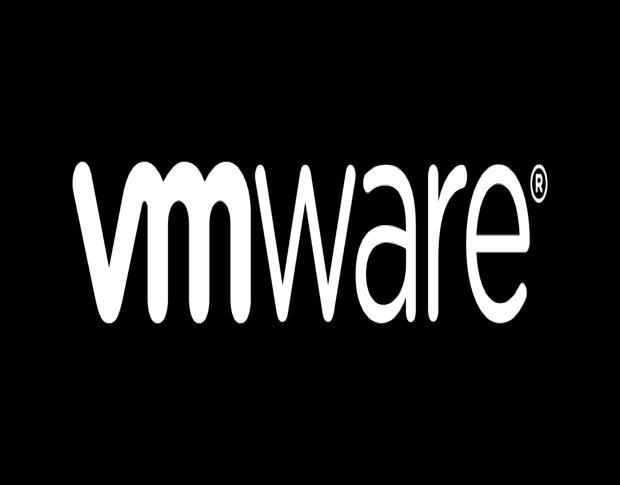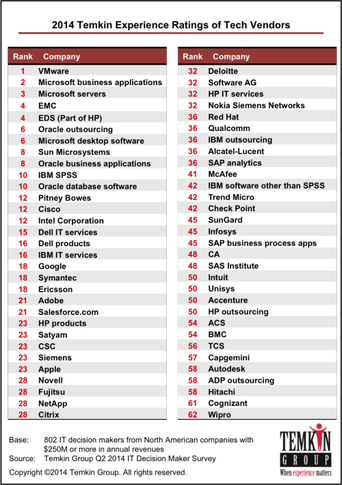VMware tops tech vendor survey about customer experiences

Image: VMware
The Temkin Group on Dec. 11, 2014 released its annual Experience Ratings of Tech Vendors survey. The results indicate a renewed focus on customer experience, yet overall, the 62 technology companies reviewed by IT decision makers didn't do so hot.
The tech vendors that achieved higher experience ratings, per the Temkin system, also enjoyed quantitative advantages when correlated to ratings for forgiveness, trust, and most importantly the likelihood of a customer buying more from a vendor. And while VMware, Microsoft business applications, and Microsoft servers notched the top three ratings, 21 vendors were rated "very poor" (below 50%) in the survey. The three lowest rated tech vendors in the 2014 report were Hitachi, Cognizant, and lastly Wipro.
The Temkin Group is a customer experience research and consulting firm that was founded by Bruce Temkin in 2010. Mr. Temkin formerly worked at Forrester Research as VP and Principal Analyst focusing on customer experience. In the fall of 2013 I covered the Temkin Group's 2013 Tech Vendor report.
For its 2014 report, the Temkin Group surveyed 802 IT decision makers at North American firms with at least $250 million in annual revenue, and asked them to evaluate their experiences with 62 specific tech vendors. The respondents answered questions about three component areas -- success, effort, and emotion -- on a seven-point scale, with one being the lowest and seven being the highest. A vendor's overall rating is the average of the three component scores.

Of the three component areas, emotion rated the lowest. Its average score in the survey was 49%; both success and effort had average scores of 55%. The average effort score for 2014 dropped two percentage points from 2013 from 55% down to 53%. The other two component averages remained the same.
The average customer experience rating for the whole survey was 52%, which is at the lower range of the "poor" rating (50% - 60%). Not much reason to break out the champagne.
Because the report methodology seeks to quantify customer experience, the Temkin Group can demonstrate some interesting results when customers have more positive results with tech vendors. Their conclusion is that "customer experience correlates to loyalty."
First, the important matter of repurchases, which are a sign of customer loyalty and a firm's financial viability. Temkin looked at the relationship between experience rating and the likelihood that respondents would buy more from a vendor. They found a "high level" of correlation: companies in the top quartile had a 15% advantage over vendors in the lowest quartile -- 61% compared to 46%.
Secondly, the report correlates experience ratings with the Temkin forgiveness score. The top quartile has a considerable advantage; these vendors had a forgiveness rating 11% points higher than the lowest quartile.
Thirdly, the same pattern holds true with the Temkin trust rating as it relates to experience rating: vendors in the top quartile had a 13-point advantage over those in the bottom quartile.
For the second year in a row, VMware took the top rating among vendors. The next four vendors at the top for 2014 were: Microsoft business applications, Microsoft servers (which took the number two spot in the 2013 report), EMC, and EDS (a division of HP). Adding to VMware's luster, they scored in the top five in all three component areas: success, effort, and emotion.
The company rated highest in six out of eight categories in the 2013 report. I asked Bruce Temkin a year ago about VMware's performance, and he noted that:
VMware has traditionally focused on the specific needs of their tech buyers. Unlike some of the other tech vendors who have a wider portfolio of products, VMware has a relatively narrow footprint in terms of the technology space that it occupies, which I think helps it be a little more focused on the needs of the customers in that space. And they've done a pretty good job of remaining focused on their market.
Temkin asserts that tech vendors have "a long way to go" when it comes to improving customer experience. The consulting firm has identified four competencies that companies have to master in order to achieve long-term customer experience advantages:
Purposeful leadership
Employee engagement
Compelling brand values
Customer connectedness
Final thoughts
It is an interesting time to be in the technology business. Older vendors are struggling to remain technologically relevant and viable, while cutting-edge startup firms are riding a pretty big wave known as disruption. But no one stays young forever, and for that matter no company, no matter how innovative they were at the outset.
Customer experience is an indispensable part of a long-term business strategy, albeit not the only one. All firms stand to gain from consistently refining and building their focus on customer experience.

